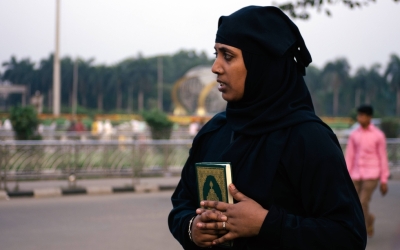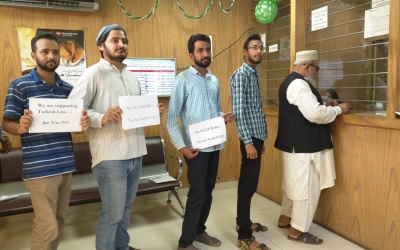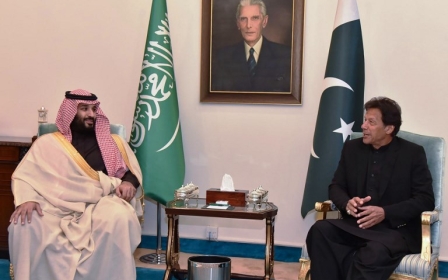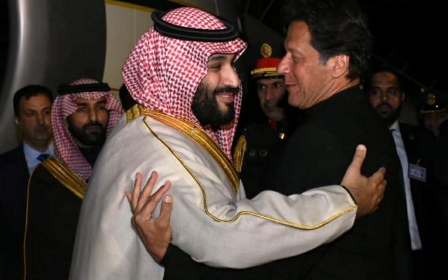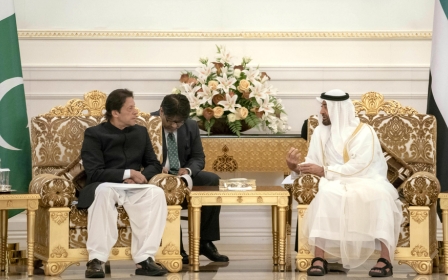Hundreds of Pakistani doctors brace for sudden deportation from Saudi Arabia
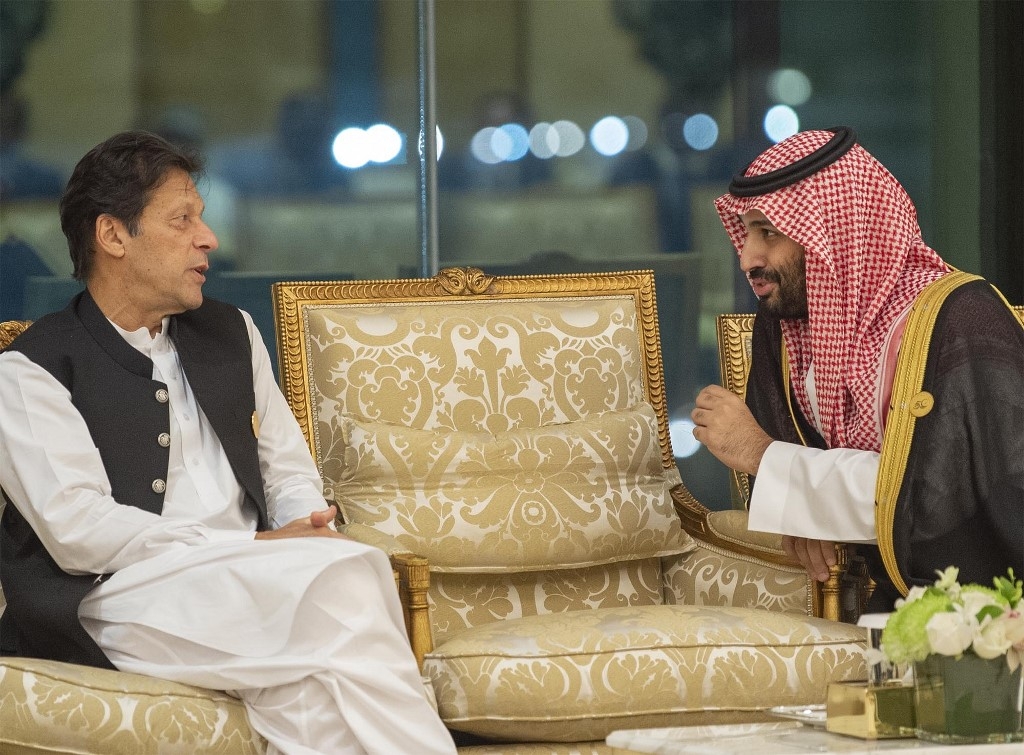
Hundreds of Pakistani doctors in Saudi Arabia are bracing themselves for the loss of their jobs and deportation after the Gulf kingdom's abrupt decision earlier this month to reject Pakistani postgraduate medical degrees.
According to termination letters issued by the Saudi Commission for Health Specialties (SCFHS) and cited by Pakistani newspaper Dawn on 7 August, Saudi authorities no longer recognise Pakistani postgraduate degree programmes - MS (Master of Surgery) and MD (Doctor of Medicine) - as acceptable qualifications for a medical licence.
New MEE newsletter: Jerusalem Dispatch
Sign up to get the latest insights and analysis on Israel-Palestine, alongside Turkey Unpacked and other MEE newsletters
"Your application for professional qualification has been rejected. Reason is that your master degree from Pakistan is not acceptable according to the SCFHS regulations," reads a letter.
According to Dawn, the majority of those who received the letter have been told to leave the country or be ready for imminent deportation.
The Saudi ministry claimed that the degrees lacked essential medical training required for senior jobs.
The news has come as a shock to many Pakistani doctors in the kingdom, many of whom have been working in Saudi Arabia for decades.
'No idea what will happen next'
Zahid, who requested to be referred to only by his first name, is among nearly a thousand Pakistani doctors living in Saudi Arabia who have had their medical license revoked as a result of the recent decision.
"My fellow colleagues at the hospital are judging me, they believe I came here with a fake degree," said Zahid, who spoke to Middle East Eye from his home in the Saudi port city of Jeddah.
"Everything I worked for is being questioned," he added. "I am in complete shock and my livelihood is at risk.
"The SCFHS has implemented the change in professional criteria overnight without any prior notification. We have no idea what will happen next."
The process of obtaining a licence in Saudi Arabia takes many months, and doctors often work until the licence is issued.
However, under the current circumstances, many doctors who were contacted by MEE said they had not received any constructive feedback on their applications from the SCFHS, and were therefore working without an approved licence until they are deported.
Zahid's reasoning for moving to Saudi Arabia was to improve the quality of life for himself and his family.
"I came to KSA [Kingdom of Saudi Arabia] for the financial rewards," he said. "I earn ten times more [$6,000] here than what I would earn in Pakistan [just over $600 a month]. But I am deeply concerned that this is in jeopardy."
'I am in complete shock and my livelihood is at risk'
- Zahid, Pakistani doctor based in Saudi Arabia
Dr Tipu Sultan, a member of the Pakistan Medical Association, said there were many reasons why working in Saudi Arabia appealed to Pakistani doctors. In addition to the financial benefits, many South Asian expatriates choose the kingdom for the presence of Islam's holiest sites in Mecca and Medina, where they can perform pilgrimages that would otherwise turn into costly journeys.
Another reason for the high level of emigrating doctors, according to Sultan, was sectarian violence in Pakistani cities like Karachi and Balochistan, especially in the early 2000s. Many mainly Shia Muslim professionals and doctors were killed at the time, leading more than 2,000 doctors to leave the country fearing for their lives.
Some of the affected doctors have accused the College of Physicians and Surgeons in Pakistan (CPSP) of being responsible for their plight.
A doctor from a private hospital in Jeddah, who spoke on condition of anonymity, told MEE that a SCFHS official had told him the CPSP itself had notified Saudi health authorities that most degrees obtained by Pakistani doctors were research-based rather than clinical.
A CPSP delegation visiting Saudi Arabia in July claimed at the time that CPSP was the only university in Pakistan to conduct clinical practices in their degree programmes, while other universities in the country providing medical degrees were merely academically focused, the anonymous Jeddah doctor added.
However, Dr Waheed Ahmed, a surgeon who has been practising in the kingdom for the past 10 years, rejected this claim.
He said the main issue was that many Saudi health accreditation officials "do not comprehend the classification system during the recruitment of foreign doctors".
Most of the doctors, he said, had obtained their degrees from Pakistan's most prestigious universities, including Quaid-i-Azam University in Islamabad, King Edward Medical University in Lahore and Liaquat University of Medical Health and Sciences in Karachi - degrees which have been accepted by Saudi Arabia since 1962.
"The Saudis are effectively creating a monopoly by Saudi doctors that will impact not only patients in the kingdom but the significant remittance between the two nations," Waheed said.
CPSP president Zafar Ullah Chaudhry did not respond to a request for comment by Middle East Eye.
The Ministry of Health in Pakistan is reportedly investigating the matter, according to a statement made on Radio Pakistan. Ministry special assistant on national health services Zafar Mirza has instructed the ministry to contact the Saudi government in order to investigate the matter.
Pakistan's Ministry of Health did not reply to multiple MEE requests for comment.
However, Sultan said an intervention by the Ministry of Health was unlikely to have an impact because "it is not familiar with the practices implemented in the Saudi eligibility criteria - therefore they are unable to assist the affected doctors in a meaningful way".
Zahid warned that the departure of Pakistani doctors would create a shortage of skilled medical professionals with specialist expertise in Saudi Arabia.
"The Saudi health council is actually harming patients in the kingdom," he said.
Saudi-Pakistan relations intact
Many of the doctors who were let go of their positions said they were surprised at the lack of formal response by the Pakistani government.
But the absence of condemnation by Prime Minister Imran Khan is likely tied to Pakistan's precarious economy. Pakistan has repeatedly accepted loans from Saudi Arabia, with the knowledge that these loans come with strings attached.
With Pakistan's economy on the brink of collapse, the country may not be in a position to jeopardise the badly needed loans.
Michael Kugelman, deputy director of the Asia programme and senior associate for South Asia at the Washington-based Wilson Centre think tank, said that Saudi leverage on the fiscally struggling nation could discourage Pakistan from condemning the recent measures.
"I don't think we should overstate the impact of a single decision to remove a group of Pakistani doctors, despite their high numbers, on Pakistani-Saudi relations," he told MEE.
"I do think, however, that the Saudis may believe that their latest bailout package to Islamabad will buy it some more leverage - and therefore give it carte blanche to make moves like this one, knowing that Islamabad won't loudly complain even if it's unhappy."
This is not good news for the doctors at risk of deportation.
Zahid said he was living in limbo, and is yet to hear back from the Saudi commission 10 months since he submitted his application.
"My future in the kingdom is in doubt. I have a family and my child is enrolled in a school here; if I lose my job everyone will suffer," he said.
"If I am deported, there is no guarantee I can provide for my family in Pakistan as the situation there is also uncertain."
Middle East Eye delivers independent and unrivalled coverage and analysis of the Middle East, North Africa and beyond. To learn more about republishing this content and the associated fees, please fill out this form. More about MEE can be found here.


